Strange Bedfellows Align Against Russia Sanctions Bill
How a handful of far-right media outlets, Redditors, and Twitter accounts tried to stop the Russia sanctions legislation in the U.S.
Strange Bedfellows Align Against Russia Sanctions Bill
Share this story
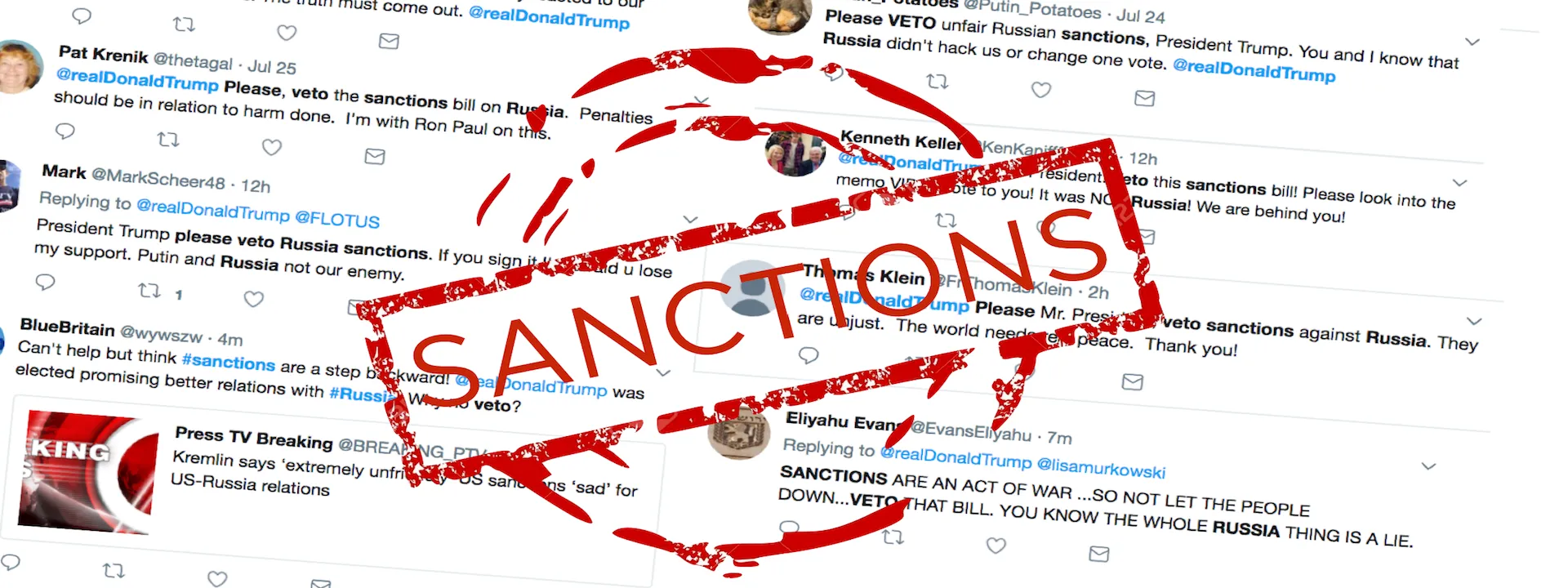
How a handful of far-right media outlets, Redditors, and Twitter accounts tried to stop the Russia sanctions legislation in the U.S.
On July 25, by a vote of 419 to 3, the U.S. House of Representatives passed a new bill to place new sanctions on Russia, North Korea, and Iran, and also give Congress the power to block any effort by the executive branch to ease sanctions on American adversaries, including Russia. The bill will now move to the Senate, after which it will go to President Donald Trump for his signature. While Trump has the right to veto any bill, White House officials have indicated that he intends to sign it into law.
Ahead of the vote, pro-Kremlin and Kremlin-backed outlets pushed an opinion piece by former Texas congressman Ron Paul attacking the draft legislation. Subsequently, alt-right activists on Twitter and Reddit called for a grassroots campaign opposing the legislation from both inside and outside the United States — including by sharing Paul’s posts.
This does not necessarily show a coordinated effort between the various actors, but the narratives are strikingly similar.
Fringe media
On July 24, Paul wrote an article titled “Trump Should Veto Congress’ Foolish New Sanctions Bill.” The article spread at significant rates through pro-Kremlin media outlets in the United States, some of which were instrumental in spreading fake stories like one about a massive U.S. tank deployment against Russia that never happened and the #SyriaHoax story, which originated in an outlet with ties to the Syrian regime and claimed the same regime never used chemical weapons. Almost 40 fringe or far right media outlets re-posted the article verbatim in less than 24 hours after it originally appeared on the Ron Paul Institute for Peace and Prosperity website. Among the outlets that re-posted were Russia Insider and therussophile.org.
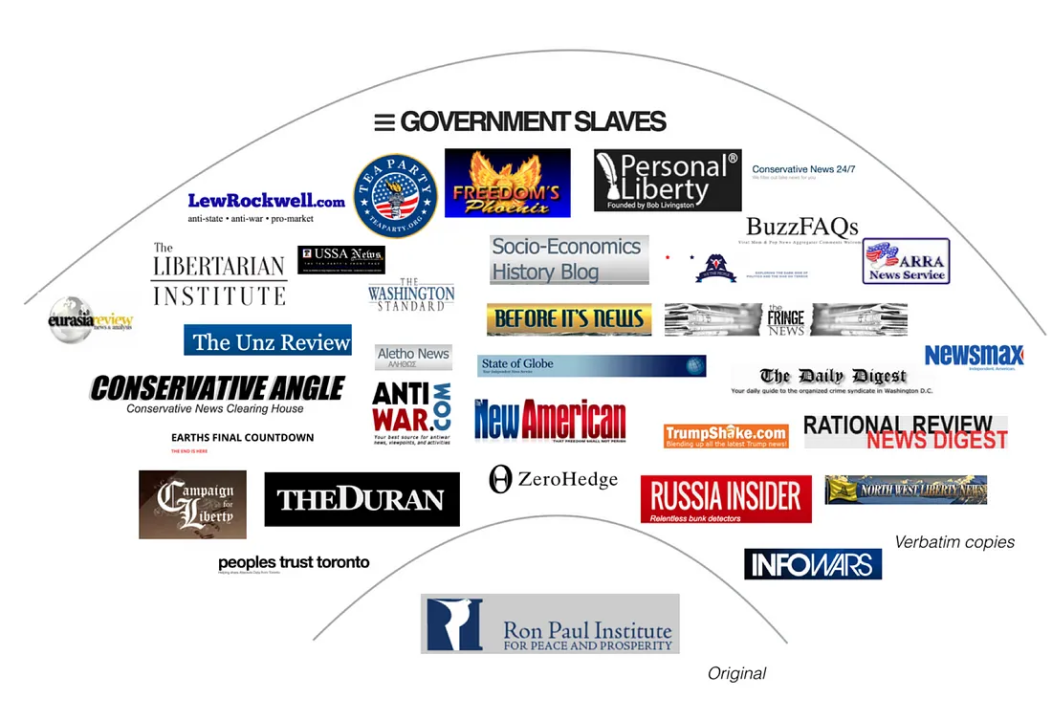
Additional exposure generated over 2,000 shares of the article across social media platforms, which is significant but not necessarily viral.
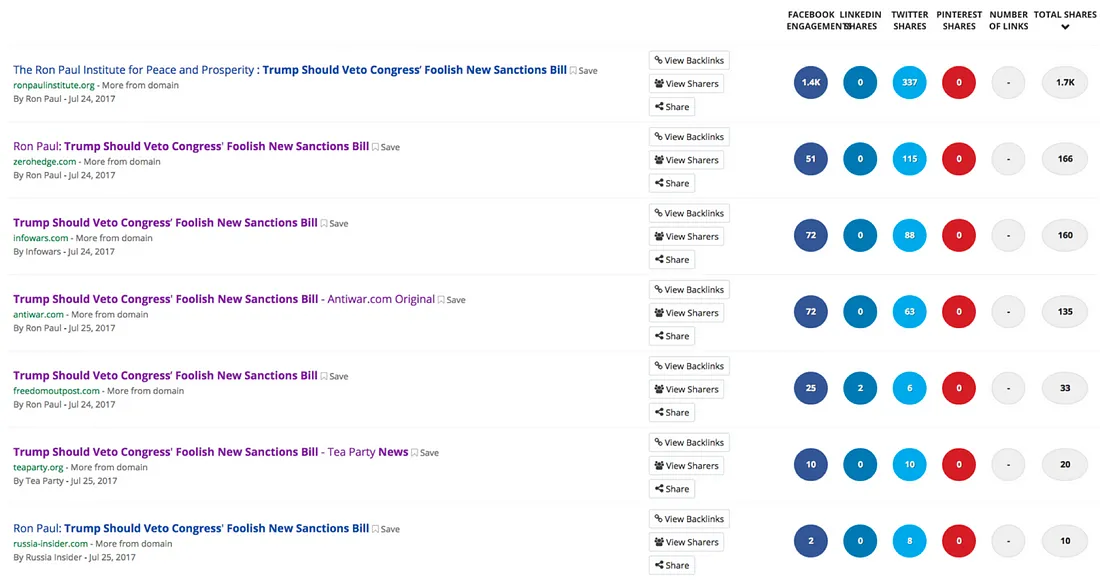
In light of the article’s success, the Ron Paul Liberty Report also released a video in which Paul and Daniel McAdams, the executive director of the Ron Paul Institute for Peace and Prosperity, argue that Trump should repeal the sanctions bill. They suggest that sanctions may lead to war, which is a standard libertarian argument. Although the bill also places additional sanctions on Iran and North Korea, they focus primarily on Russia, with “Russia” and “Putin” mentioned 32 times, while “Iran” and “North Korea” together were mentioned 16 times.
Paul and his co-host provide three arguments to explain why the U.S. should drop the anti-Russian sanctions. First, they suggest that the U.S. caused the “coup” in Ukraine, forcing Russian intervention. They go on to justify Russia’s annexation of Crimea, based on what they argue was a legitimate “referendum” vote, and try to diminish Russian meddling in the U.S. elections by accusing the United States of doing the same in Latin America and Ukraine.
These claims, regularly made by Russian government officials, are factually incorrect. Russia, violating international law and its own promises to Ukraine, annexed Crimea after massive protests in Ukraine toppled then-president Viktor Yanukovych, a long-time ally of Russian President Vladimir Putin. The referendum was organized in less than three weeks, under conditions of military occupation by Russian Special Forces soldiers, and was rejected by 100 members of the UN General Assembly.
Less than 24 hours after Paul’s article was first published, Russian state broadcaster RT interviewed McAdams (as they have done before):
In the interview, McAdams made arguments similar to those he made in the video with Paul. He claimed: “Russia didn’t start Ukraine, the United States started Ukraine,” “The U.S. caused the problems in Ukraine,” “There is no proof of Russian meddling whatsoever,” and “If President Trump does not veto this bill, it will signify that he’s absolutely given up on his presidency.”
At the end of the video, McAdams calls on the viewers to contact their senators and representatives and tell them, “We don’t want this.”
The video appears to have sparked an online campaign of Twitter users sharing Paul’s video and urging Trump to veto the bill.
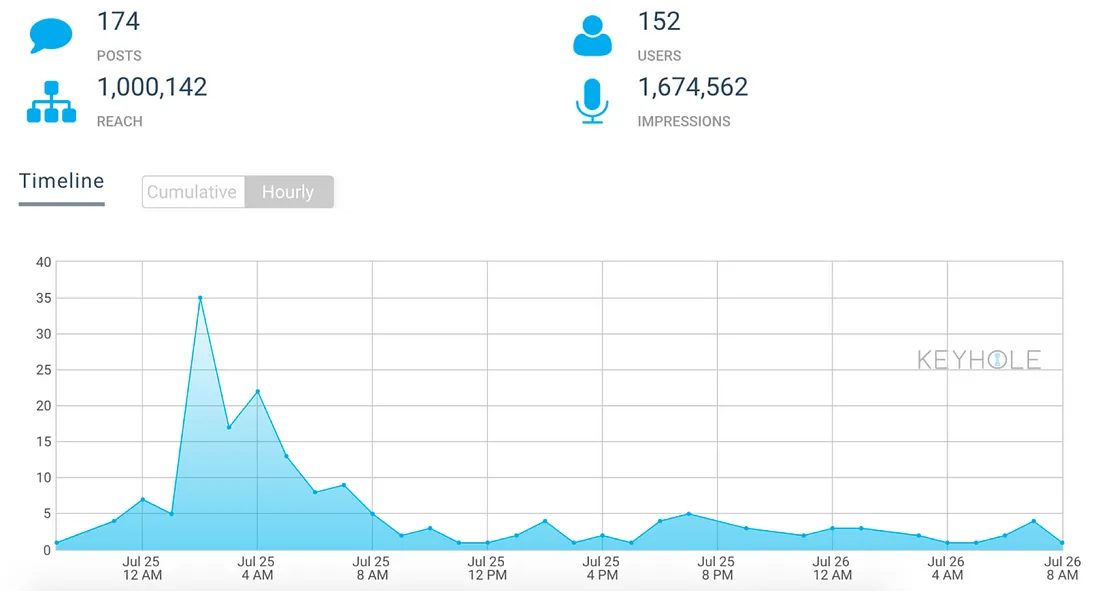
@DFRLab identified 174 tweets with a mention of “Mr. President Veto this Bill! — Sanctions Lead to War,” as well as 247 tweets with a hyperlink leading to the Ron Paul Liberty Report video.
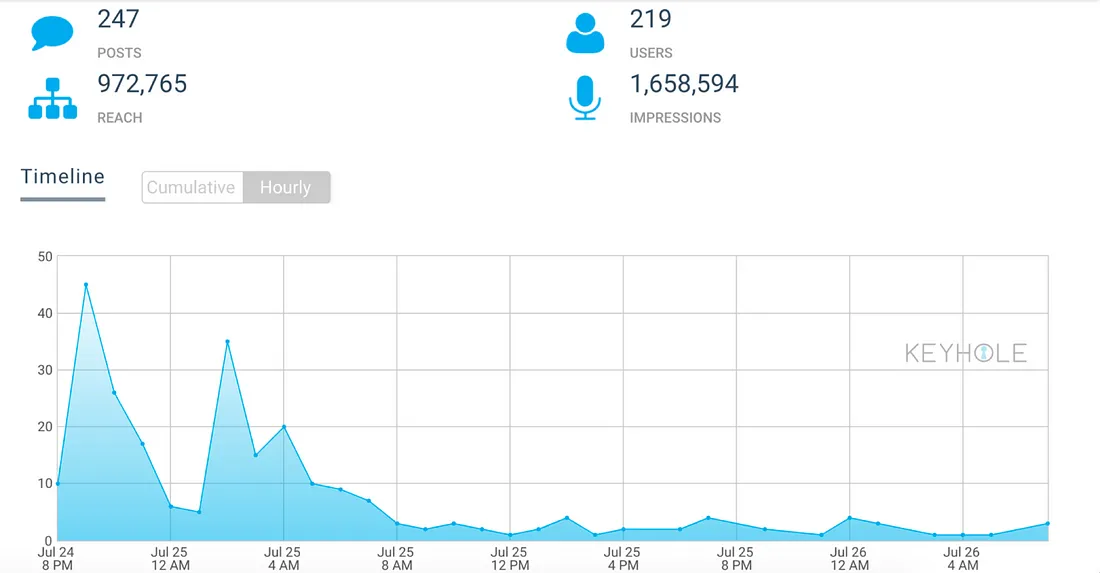
Separately, @DFRLab identified several dozen tweets asking the president to veto the bill directly, using his @RealDonaldTrump handle.
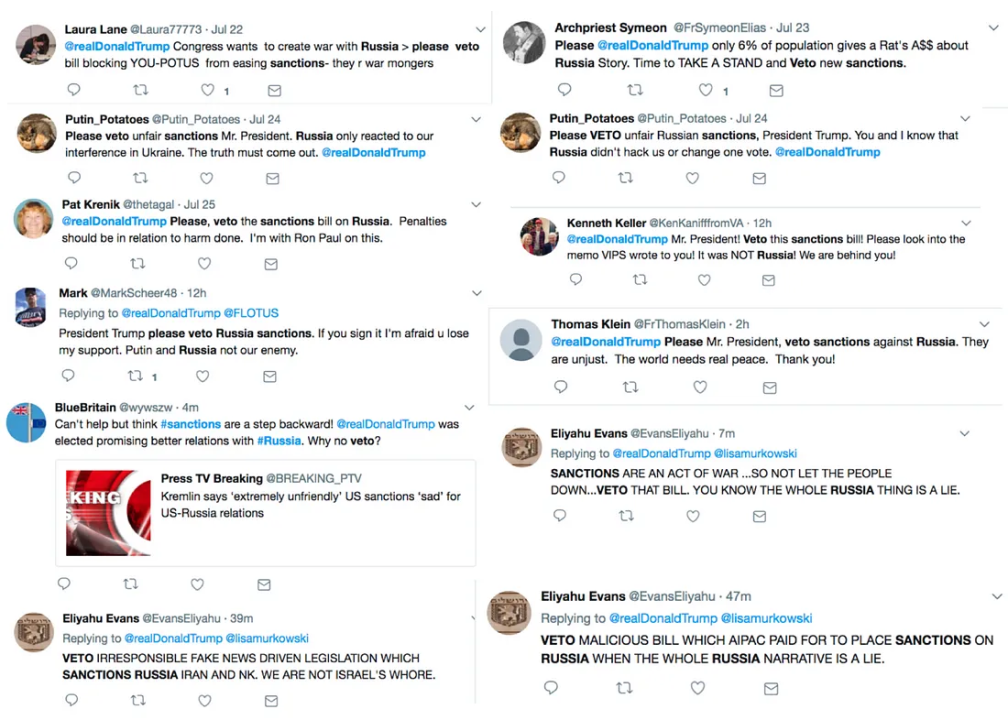
Paul was not the only influencer embraced by the fringe media. Reddit and 4chan attempted to mobilize their own communities too.
A review of recent posts in the Reddit forum /r/The_Donald, which is known to be an alt-right forum similar to sites on which @DFRLab reported here and here, reveals several calls for Redditors and 4channers to do everything they can to block the new sanctions bill.
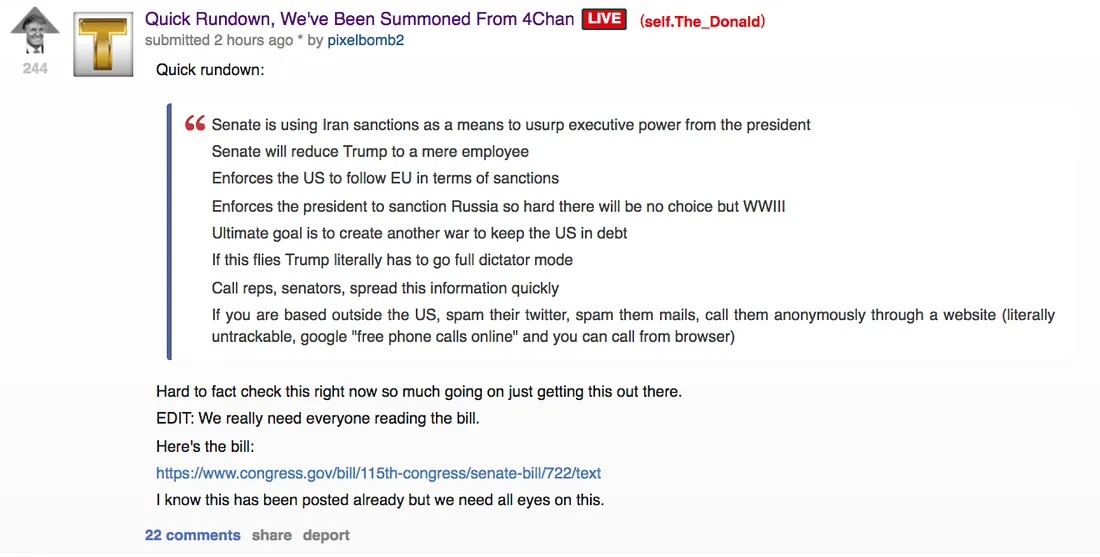
The text reads:
Senate is using Iran sanctions as a means to usurp executive power from the president
Senate will reduce Trump to a mere employee
Enforces the US to follow EU in terms of sanctions
Enforces the president to sanction Russia so hard there will be no choice but WWIII
Ultimate goal is to create another war to keep the US in debt
If this flies Trump literally has to go full dictator mode
Call reps, senators, spread this information quickly
If you are based outside the US, spam their twitter, spam them mails, call them anonymously through a website (literally untrackable, google “free phone calls online” and you can call from browser)
While some Redditors called for immediate action, others appear to be playing the long game and mobilizing their community to vote out of office the 419 representatives who supported the bill.

Other /r/The_Donald participants did not call for action, but did attempt to portray the bill as a deep state “takeover.”
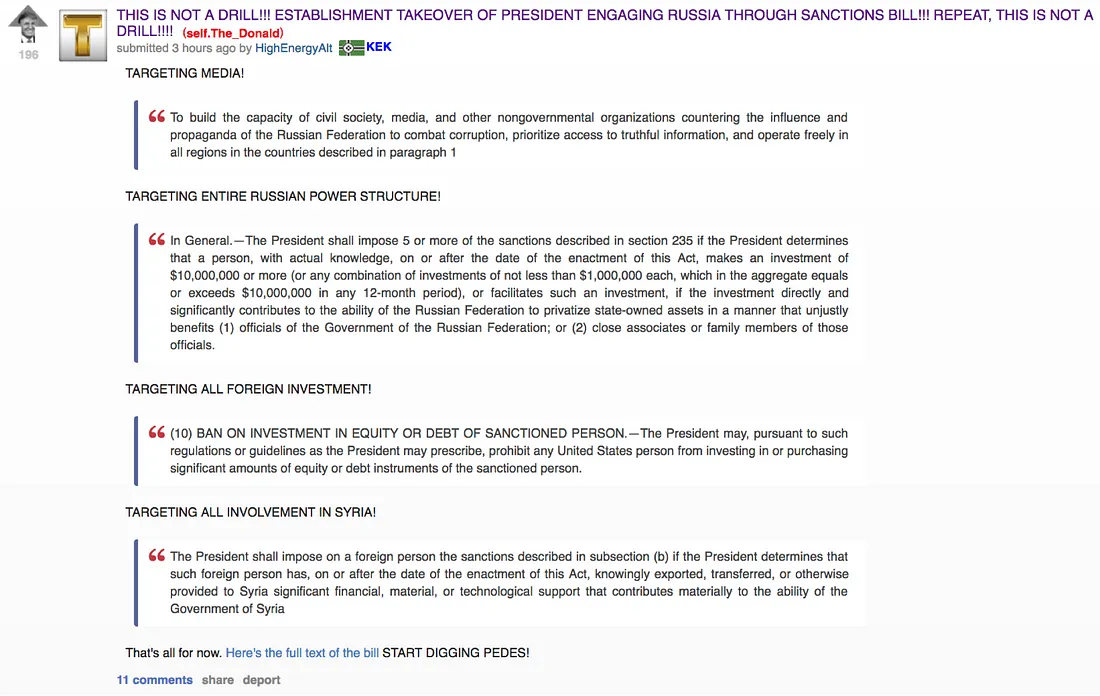
All of this online activity demonstrates there is a small but potent campaign to encourage Trump to veto the new sanctions bill. The campaign’s strategy seems to be based on penetrating the online spaces that Trump supporters are known to frequent — Twitter, Reddit, and fringe media sites. In forums where the campaign is discussed and coordinated, the users readily acknowledge an element of international coordination in their call to action.
This instance of narratives being propagated against the Russia sanctions bill bears a striking resemblance to other far-right or alt-right coordination efforts on which @DFRLab previously reported, such as the 2017 presidential elections in France (#MacronLeaks) and the upcoming elections in Germany. In this case, the forum participants in /r/The_Donald are not exclusively located in the United States, but they are dedicated to alt-right ideology and policy outcomes. This kind of message amplification further indicates at least an alignment between populist, nationalist, anti-globalist, and often pro-Kremlin ideologies that go beyond specific geographic locations.
That alignment is not the result of coordination: it appears more likely to be a marriage of convenience rather than a marriage of choice.

